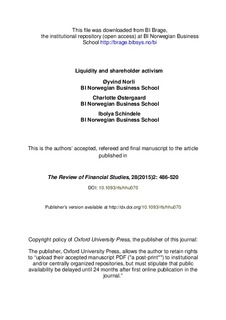| dc.contributor.author | Norli, Øyvind | |
| dc.contributor.author | Østergaard, Charlotte | |
| dc.contributor.author | Schindele, Ibolya | |
| dc.date.accessioned | 2015-03-10T12:09:44Z | |
| dc.date.available | 2015-03-10T12:09:44Z | |
| dc.date.issued | 2015 | |
| dc.identifier.citation | The Review of Financial Studies, 28(2015)2: 486-520 | nb_NO |
| dc.identifier.issn | 0893-9454 | |
| dc.identifier.issn | 1465-7368 | |
| dc.identifier.uri | http://hdl.handle.net/11250/278813 | |
| dc.description | This is the authors’ accepted, refereed and final manuscript to the article | nb_NO |
| dc.description.abstract | Blockholders' incentives to intervene in corporate governance are weakened by free-rider problems and high costs of activism. Theory suggests activists may recoup expenses through informed trading of target rms' stock when stocks are liquid. We show that stock liquidity increases the probability of activism but does less so for potentially overvalued rms for which privately informed blockholders may have greater incentives to sell their stake than to intervene. We also document that activists accumulate more stocks in targets when stock is more liquid. We conclude that liquidity helps overcome the free-rider problem and induces activism via preactivism accumulation of target rms' shares. (JEL G14, G34) | nb_NO |
| dc.language.iso | eng | nb_NO |
| dc.publisher | Oxford University Press | nb_NO |
| dc.title | Liquidity and shareholder activism | nb_NO |
| dc.type | Journal article | nb_NO |
| dc.type | Peer reviewed | nb_NO |
| dc.source.journal | The Review of Financial Studies | nb_NO |
| dc.identifier.doi | 10.1093/rfs/hhu070 | |
| dc.description.localcode | 2, Forfatterversjon | nb_NO |
